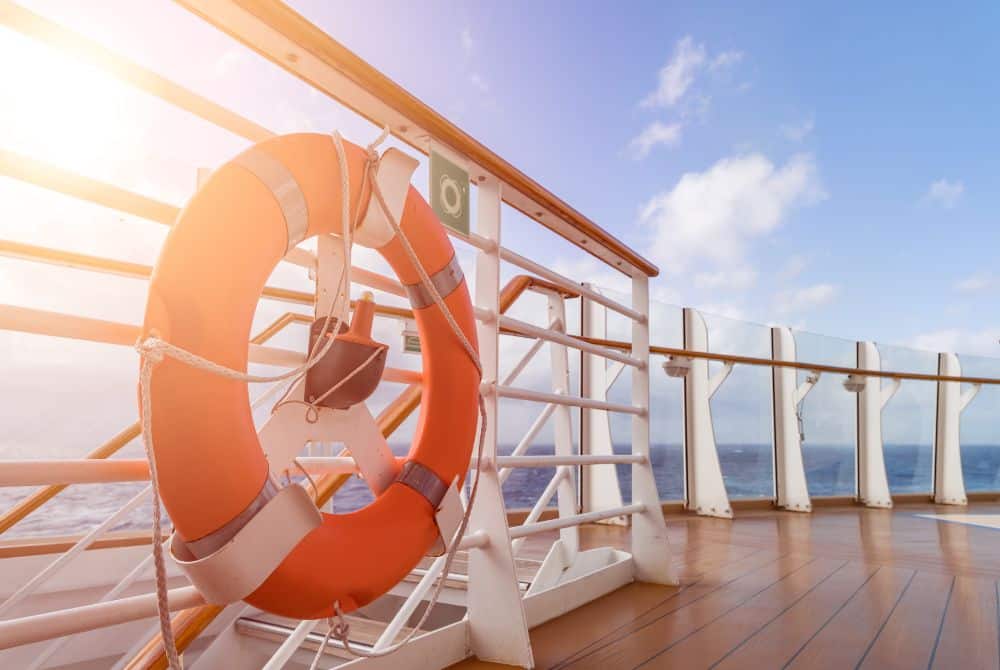When going on a cruise, one of the worst things people can imagine happening is falling overboard. However, it does happen – probably more than people realize.
Recently, a woman fell off a cruise ship. The Coast Guard recovered her dead body about 18 miles from Port Canaveral, where her boat headed. The cruise line stated that their advanced detection systems let people know a passenger had gone over, but it didn’t make a difference in the end.
When going on a cruise, you’ve got to have all your bases covered. After all, it’s a mode of travel unlike any other. But when things go wrong, you have to understand where you stand.
What happens if someone falls overboard on a ship? Do cruise ships have overboard sensors that allow the crew to know when someone has plummeted into the ocean below? Read on to find out what you need to know.
Will a Cruise Ship Stop If Someone Goes Overboard?
Most people assume that if an individual tumbles over the railings, the boat will stop. The answer will put your mind at ease, knowing that a cruise ship will stop and search for the victim. However, you must remember that some cruise ships can take up to a mile to stop entirely. They then have to turn around. That’s why the success rate of finding overboard passengers is only about 25 percent, with many factors influencing a rescue attempt’s success, such as the weather and time of day.
Only 25 people fall off ships at sea yearly, so the chances of falling overboard are slim. But it’s in your best interest to know what will happen if bad luck bestows upon you and your traveling party.
What Causes People To Fall Off of Cruise Ships?
There are many reasons why someone may fall off a cruise ship. The most common include:
- Guests climbing on railings
- Suicide
- Murder
- Passengers who are under the influence of drugs or alcohol
Overboard Sensors: Do All Cruise Ships Have Them?
Some cruise ships have man overboard sensors, but most do not currently have these detection devices. About 30 cruise ships owned by Disney Cruise Line and Carnival Cruise Line have these sensor systems, which alert the ship’s bridge automatically if someone falls overboard.
Ships are also equipped with closed-circuit television cameras to monitor events on a ship, but these are primarily used in the wake of an incident, not to detect that someone has gone overboard.

Most ships rely on crew members or fellow passengers to report a person going overboard and alert the proper ship authorities that it has occurred. If someone goes overboard on a boat without any sensors, it could be hours or days before anyone is aware of the incident, and the ship likely won’t know where to look to go back and try to find the passenger.
The chances of a person going overboard on your cruise are slim. It’s still essential to understand how to prevent these things – and what the cruise line’s responsibility is in case it happens.
About the Author:
Andrew Winston is a partner at the personal injury law firm Winston Law. For over 20 years, he has successfully represented countless people in all personal injury cases, focusing on child injury, legal malpractice, and premises liability. He has been recognized for excellence in representing injured clients by admission to the Million Dollar Advocates Forum and named one of America’s Top 100 High-Stakes Litigators. Mr. Winston is AV Preeminent Rated by the Martindale-Hubbell Law Directory, enjoys a 10.0 rating by AVVO as a Top Personal Injury Attorney, and has been selected as a Florida “SuperLawyer” from 2011-2022– an honor reserved for the top 5% of lawyers in the state – was voted to Florida Trend’s ”Legal Elite,” recognized by Expertise as one of the 20 Best Fort Lauderdale personal injury attorneys, named one of the Top 100 Lawyers in the Miami area for 2015-2022, and one of the Top 100 Lawyers in Florida for 2015-2017 and 2019-2022.







